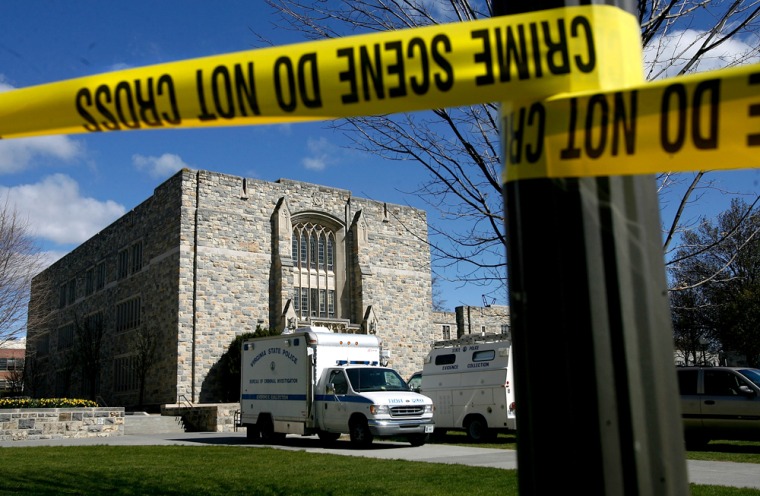On a university campus of 2,600 acres, with more than 25,000 students, ironclad security is not a practical goal. Even so, tough questions swiftly surfaced as to how effectively Virginia Tech authorities responded to Monday’s horrific massacre.
Why were campus police so sure the threat was a “domestic dispute” contained in one dormitory, when most of the killings occurred two hours later in a classroom building?
Why were they interviewing a “person of interest” off campus in regard to the first shootings at the very time the classroom killings were unfolding?
Why was there a lag of more than two hours after the first shootings before an alarm was e-mailed campuswide — around the time the second, more deadly burst of carnage occurred? And more generally, some security experts wondered, was the school’s crisis planning and emergency communications system up to the task?
Clearly, something went terribly wrong.
Bombarded with security questions at afternoon and evening news conferences, Virginia Tech President Charles Steger said authorities believed the shooting at the West Ambler Johnston dorm, first reported about 7:15 a.m., was a domestic dispute and thought the gunman had fled the campus after killing two people.
“We had no reason to suspect any other incident was going to occur,” he said.
Feasibility of lockdown
The dormitory was locked down immediately after the shooting, Steger said, and a phone bank was activated to alert the resident advisers there so they could go door-to-door warning the 900 students in the dorm. Security guards surrounded the dorm, he said, and others began a sweep across campus.
Asked why he didn’t order a lockdown of the entire campus, Steger noted that thousands of nonresident students were arriving for 8 a.m. classes, fanning out across the sprawling campus from their parking spots.
“Where do you lock them down?” Steger asked.
He said security on campus will be tightened now, but offered no details.
“We obviously can’t have an armed guard in front of every classroom every day of the year,” he said.
Overall, Steger defended the university’s response, saying: “You can only make a decision based on the information you know at that moment in time. You don’t have hours to reflect on it.”
Virginia Tech Police Chief Wendell Flinchum said there no surveillance cameras in place that recorded the gunman entering Norris Hall, the classroom building where 31 people were killed. Among the dead was the gunman, who killed himself before police could break through a chained door and reach the second-floor room where the massacre occurred.
Two-hour window
Some students were upset that the gunman was able to strike a second time, saying the first notification they got of the shootings came in an e-mail at 9:26 a.m. The e-mail mentioned a “shooting incident” at West Ambler Johnston, said police were investigating, and asked students to be cautious and contact police about anything suspicious.
Student Maurice Hiller said he went to a 9 a.m. class two buildings away from the engineering building, and no warnings were coming over the outdoor public address system on campus at the time.
“I was troubled with the fact that two hours elapsed from the first shooting,” said Brant Martel, 23, a junior. “I just feel they were a little slow on their response.”
But Edmund Henneke, an associate dean of engineering who was in the building where the second round of shootings occurred, said criticism of the authorities’ response was unfair.
“We have a huge campus,” he said. “You have to close down a small town and you can’t close down every way in or out.”
Emergency communications in place?
Security experts not connected with Virginia Tech said their immediate questions focused on whether the university had adopted and practiced a plan to handle such dire crises, and whether its system of emergency communications was state-of-the-art.
“The key is to have a solid communications component in place to deal with notifying students, parents, faculty, staff and the media what’s going on,” said Kenneth Trump of National School and Safety Services in Cleveland.
“The most critical element that falls apart in any type of emergency, especially at educational institutions, is often communications,” he said.
University officials acknowledged that crisis communication is a challenge on such a large campus. They said they have been working on creating an alert system that would send text messages to staff and student cell phones, but the system is not yet ready.
Training is crucial
Michael Dorn of Safe Havens International in Macon, Ga., which has advised many universities on security measures, said campus emergency plans can be ineffective unless staff and students are trained on how to cooperate.
“They can make the difference between one or two people being victimized and larger numbers,” Dorn said. “But it’s a lot harder to do that in higher education that in a K-12 school. A lot of higher ed officials don’t have the basic things in place that our K-12 schools have.”
It was second time in less than a year that the Virginia Tech campus was closed because of a shooting.
Last August, the opening day of classes was canceled and the campus closed when an escaped jail inmate allegedly killed a hospital guard off campus and fled to the Tech area. A sheriff’s deputy involved in the manhunt was killed on a trail just off campus. The accused gunman, William Morva, faces capital murder charges.
As for other crime on campus, Virginia Tech reported just eight arrests for illegal weapons possession from 2003-05, according to statistics posted by the U.S. Department of Education. Flinchum said weapons are not allowed on campus.
